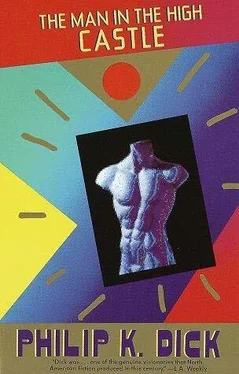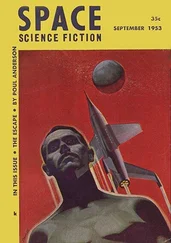Leaving his hotel room, Mr. Baynes descended by elevator to the lobby. Outside on the sidewalk, he had the doorman call a pedecab for him, and soon he was on his way up Market Street, the Chinese driver pumping away energetically.
“There,” he said to the driver, when he made out the sign which he was watching for. “Pull over to the curb.”
The pedecab stopped by a fire hydrant. Mr. Baynes paid the driver and sent him off. No one seemed to have followed. Mr. Baynes set off along the sidewalk on foot. A moment later, along with several other shoppers, he entered the big downtown Fuga Department Store.
There were shoppers everywhere. Counter after counter. Salesgirls, mostly white, with a sprinkling of Japanese as department managers. The din was terrific.
After some confusion Mr. Baynes located the men’s clothing department. He stopped at the racks of men’s trousers and began to inspect them. Presently a clerk, a young white, came over, greeting him.
Mr. Baynes said, “I have returned for the pair of dark brown wool slacks which I was looking at yesterday.” Meeting the clerk’s gaze he said, “You’re not the man I spoke to. He was taller. Red mustache. Rather thin. On his jacket he had the name Larry.”
The clerk said, “He is presently out to lunch. But will return.”
“I’ll go into a dressing room and try these on,” Mr. Baynes said, taking a pair of slacks from the rack.
“Certainly, sir.” The clerk indicated a vacant dressing room, and then went off to wait on someone else.
Mr. Baynes entered the dressing room and shut the door. He seated himself on one of the two chairs and waited.
After a few minutes there was a knock. The door of the dressing room opened and a short middle-aged Japanese entered. “You are from out of state, sir?” he said to Mr. Baynes. “And I am to okay your credit? Let me see your identification.” He shut the door behind him.
Mr. Baynes got out his wallet. The Japanese seated himself with the wallet and began inspecting the contents. He halted at a photo of a girl. “Very pretty.”
“My daughter. Martha.”
“I, too, have a daughter named Martha,” the Japanese said. “She at present is in Chicago studying piano.”
“My daughter,” Mr. Baynes said, “is about to be married.”
The Japanese returned the wallet and waited expectantly.
Mr. Baynes said, “I have been here two weeks and Mr. Yatabe has not shown up. I want to find out if he is still coming. And if not, what I should do.”
“Return tomorrow afternoon,” the Japanese said. He rose, and Mr. Baynes also rose. “Good day.”
“Good day,” Mr. Baynes said. He left the dressing room, hung the pair of slacks back up on the rack, and left the Fuga Department Store.
That did not take very long, he thought as he moved along the busy downtown sidewalk with the other pedestrians. Can he actually get the information by then? Contact Berlin, relay my questions, do all the coding and decoding—every step involved?
Apparently so.
Now I wish I had approached the agent sooner. I would have saved myself much worry and distress. And evidently no major risk was involved; it all appeared to go off smoothly. It took in fact only five or six minutes.
Mr. Baynes wandered on, looking into store windows. He felt much better now. Presently he found himself viewing display photos of honky-tonk cabarets, grimy flyspecked utterly white nudes whose breasts hung like half-inflated volleyballs. That sight amused him and he loitered, people pushing past him on their various errands up and down Market Street.
At least he had done something, at last.
What a relief!
Propped comfortably against the car door, Juliana read. Beside her, his elbow out the window, Joe drove with one hand lightly on the wheel, a cigarette stuck to his lower lip; he was a good driver, and they had covered a good deal of the distance from Canon City already.
The car radio played mushy beer-garden folk music, an accordion band doing one of the countless polkas or schottishes; she had never been able to tell them one from another.
“Kitsch,” Joe said, when the music ended. “Listen, I know a lot about music; I’ll tell you who a great conductor was. You probably don’t remember him. Arturo Toscanini.”
“No,” she said, still reading.
“He was Italian. But the Nazis wouldn’t let him conduct after the war, because of his politics. He’s dead, now. I don’t like that von Karajan, permanent conductor of the New York Philharmonic. We had to go to concerts by him, our work dorm. What I like, being a wop—you can guess.” He glanced at her. “You like that book?” he said.
“It’s engrossing.”
“I like Verdi and Puccini. All we get in New York is heavy German bombastic Wagner and Orff, and we have to go every week to one of those corny U.S. Nazi Party dramatic spectacles at Madison Square Garden, with the flags and drums and trumpets and the flickering flame. History of the Gothic tribes or other educational crap, chanted instead of spoken, so as to be called ‘art.’ Did you ever see New York before the war?”
“Yes,” she said, trying to read.
“Didn’t they have swell theater in those days? That’s what I heard. Now it’s the same as the movie industry; it’s all a cartel in Berlin. In the thirteen years I’ve been in New York not one good new musical or play ever opened, only those—”
“Let me read,” Juliana said.
“And the same with the book business,” Joe said, unperturbed. “It’s all a cartel operating out of Munich. All they do in New York is print; just big printing presses—but before the war, New York was the center of the world’s publishing industry, or so they say.”
Putting her fingers in her ears, she concentrated on the page open in her lap, shutting his voice out. She had arrived at a section in The Grasshopper which described the fabulous television, and it enthralled her; especially the part about the inexpensive little sets for backward people in Africa and Asia.
…Only Yankee know-how and the mass-production system—Detroit, Chicago, Cleveland, the magic names!—could have done the trick, sent that ceaseless and almost witlessly noble flood of cheap one-dollar (the China Dollar, the trade dollar) television kits to every village and backwater of the Orient. And when the kit had been assembled by some gaunt, feverish-minded youth in the village, starved for a chance, for that which the generous Americans held out to him, that tinny little instrument with its built-in power supply no larger than a marble began to receive. And what did it receive? Crouching before the screen, the youths of the village—and often the elders as well—saw words. Instructions. How to read, first. Then the rest. How to dig a deeper well. Plow a deeper furrow. How to purify their water, heal their sick. Overhead, the American artificial moon wheeled, distributing the signal, carrying it everywhere… to all the waiting, avid masses of the East.
“Are you reading straight through?” Joe asked. “Or skipping around in it?”
She said, “This is wonderful; he has us sending food and education to all the Asiatics, millions of them.”
“Welfare work on a worldwide scale,” Joe said.
“Yes. The New Deal under Tugwell; they raise the level of the masses—listen.” She read aloud to Joe:
…What had China been? Yearning, one needful commingled entity looking toward the West, its great democratic President, Chiang Kai-shek, who had led the Chinese people through the years of war, now into the years of peace, into the Decade of Rebuilding. But for China it was not a rebuilding, for that almost supernaturally vast flat land had never been built, lay still slumbering in the ancient dream. Arousing; yes, the entity, the giant, had to partake at last of full consciousness, had to waken into the modern world with its jet airplanes and atomic power, its autobahns and factories and medicines. And from whence would come the crack of thunder which would rouse the giant? Chiang had known that, even during the struggle to defeat Japan. It would come from the United States. And, by 1950, American technicians and engineers, teachers, doctors, agronomists, swarming like some new life form into each province, each—
Читать дальше










